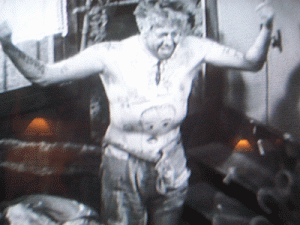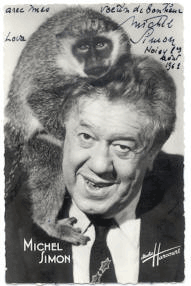 “When people see Boudu Saved From Drowning or L’Atalante for the first time, they sometimes ask ‘Was Michel Simon really like that?’ –David Thomson
“When people see Boudu Saved From Drowning or L’Atalante for the first time, they sometimes ask ‘Was Michel Simon really like that?’ –David Thomson
The answer, as Thomson points out, is somewhere between yes and no. Michel Simon is one of my favorite actors, a strange beast of a man, stomping through his movies like some satyr intent on disrupting the proceedings and yet, magically, somehow deferring to others so that his movies remain balanced. When I describe L’Atalante as the story of a man, a sailor, who lives on a riverboat, who marries a woman from the city, and mention that his shipmate is Simon’s Jules, a towering man often wandering about without a shirt, exposing his tattoos, living in the hold with a million strange items (including a pair of human hands in a jar), you’d think he’d steal the picture. But Simon clearly loved his work, and his ego seemed, at times, to be the smallest thing about him. And that, I think, makes him a perfect actor.
Look at Michel Simon: a lumbering giant with tremedous grace. A doughy face no doubt made soft from the blow of a few dozen boxing matches, yet capable of amazing expression. Able to menace and yet someone that children found irresistible. The man had a simian-like ability to leap and climb and squeeze into small spaces. When he ate it appeared as if he’d devour everything on the table, perhaps even the table itself. On a ship he seems to be the kind of a fellow who built his muscles wrestling giant squid, on land he could be a Gargantua, devouring and drinking and farting.
And yet we see in L’Atalante that this strange man is one capable of melancholy and sadness, and perhaps even an hint of jealousy at the love between the captain and his woman, even as we know that he is no threat, but instead a guardian of this confused couple.
Michel Simon was the son of a sausage maker, and lit out for Paris at a young age. He worked as a boxer, as a photographer (I can’t imagine this giant crouched down behind a camera, asking his clients to please stop gaping), and, according to his terse Wikipedia entry, scraping by selling smuggled lighters.
In the army, he was often in trouble, and ended up with tuberculosis, which doesn’t seem to have slowed him down or kept him away from damp climates. He was a magician (of course), acrobat (how he could he not?), and then hit upon acting, walking onto the set of a production Hedda Gabler and not looking back.
Michel Simon inspired a number of great directors, from Carl Theodor Dreyer, Jean Vigo, Marcel Carne, and later, Claude Berri, and both Arthur Penn and Jean-Luc Godard. Penn cast him in The Train (before Penn was removed from that project), and Godard had Jean-Paul Belmondo do his best imitation of Simon in that crazy movie Breathless.
Michel Simon lived his finals days in a cluttered apartment, supposedly with his animals, including squirrels and monkeys, amongst his large collection of bric-a-brac, and a supposedly impressive amount of erotica. “I prefer to live with animals than humans,” he famously said, and you can see that in his characters.
And yet he didn’t shy away from people. But he couldn’t live with them. L’Atalante, Boudu Saved From Drowning, and The Train all share that dichotomy–Simon in his element, engaging with people even as he comes to reject them, preferring the company of a ship or behind the wheel of a locomotive or just floating down a river, to hell with a boat.
Michel Simon was born 9 April 1895 (the same year as cinema, he used to say), and died 30 May 1975. He is buried with his parents in the Grand-Lancy Cemetery of Geneva.

